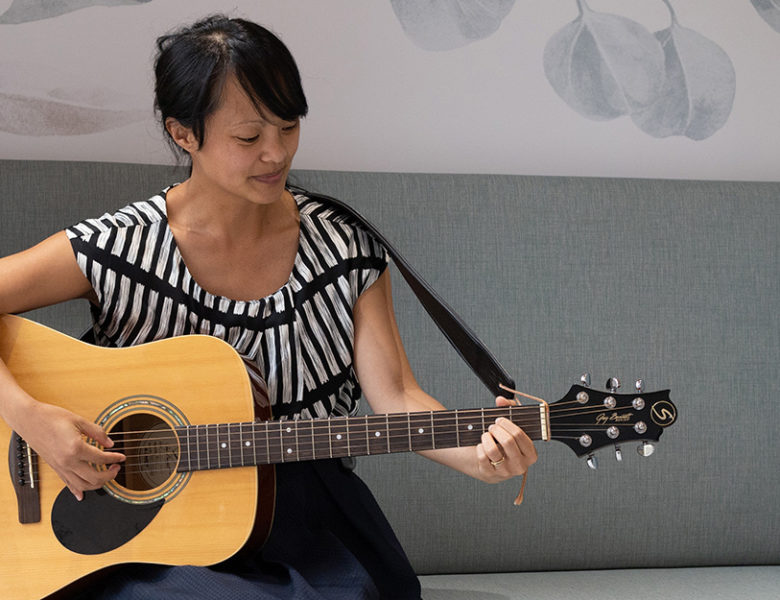Music Therapy: the power of mum’s voice
“A mum’s voice in a hospital setting is the safest sound the baby will hear while they’re there,” said Registered Music Therapist, Maybelle Swaney. “How lovely would it be to hear mums all throughout the Hospital nurseries singing with their babies and letting them know that they’re there for them?”
Music therapy is an evidence-based allied health intervention. It makes use of music as the primary modality for promoting positive changes in participants. Maybelle is a paediatric Music Therapist at the Women’s and Children’s Hospital. Her work involves the use of music-based experiences to help children and their families better cope with their Hospital journey. The Music Therapy program in the Nursery is funded through the WCH Foundation’s Arts in Health program.
In the Hospital nurseries, Maybelle partners with parents to provide positive sensory stimulus for their babies and promote bonding experiences. This includes supporting families to create songs and lullabies, play music and sing to their baby. There is evidence that this helps to encourage attachment, support recovery and improve growth and development for babies in hospital.
Freddy, Kara and Haydn

Baby Freddy and mum, Kara, at the Women’s and Children’s Hospital.
Baby Freddy was born 10 weeks premature at the WCH. He spent one week in the Neonatal Intensive Care Unit (NICU) and five weeks in the Specialist Care Baby Unit (SCBU).
A SCBU coordinator introduced mum, Kara, to Maybelle. She began the Music Therapy program with her husband, Haydn, as a welcome distraction from hospital life.
“In the first month I couldn’t do much for Freddy. I could express milk and I could hold him for a couple of hours a day. He needed to be in his incubator growing though. So, to be able to focus on something else made it a lot easier,” she said.
The Music Therapy program
Maybelle came into Kara’s first session with a guitarlele and some nursery rhymes, but Kara asked if she could try singing something she felt more comfortable with. The first thing that came to mind was the Sound of Music.
“I grew up listening and watching that movie with my Nonna, repeatedly. I think it was the only time I would hear her sing in English, so there was a personal connection. I knew I would be able to sing those songs, whereas I wouldn’t be able to sing Twinkle, Twinkle Little Star.”
Kara said Maybelle was completely keen to change things up.
“She was incredibly open to the idea, there was no judgment or criticism.”
Maybelle explained that music therapy is all about working alongside families.
“It’s not about me coming in and being the expert. It’s about learning from the families as the experts on their own babies,” she said.
“It’s asking families how they think music is going to be useful for them in that setting, and then working to see if we can build a bit of a bridge between here and there.”
“Think about it in terms of mum as the soloist and the therapist as the accompaniment. That’s a really good reflection of what music therapy as a service provides. We’re there to accompany the parents on their journey and never to take over.”
With Maybelle’s help, Kara recorded herself singing songs from the soundtrack and even rewrote some of the lyrics to suit her family’s situation. Haydn recorded himself at home reading books for Freddy. With all the recordings, Maybelle made the family a beautiful album of songs and readings that they played for Freddy in the Hospital and continue to play for him now at home.
“When he wakes up in the middle of the night for his feed and I really don’t have any energy to sing, I’ll put him down, play the recording, and slowly remove myself from the room while he falls asleep.”
A new experience
Although Kara was sold at the words “music therapy”, Haydn was a little wary about the experience to begin with. Kara said his recordings turned out “really sweet” with his anecdotes and sound effects, including recording their dog Moki, to add to the stories.
“I think that’s an example of how, if you’re presented with an experience, and even if you need a little push to do it, what can come out of it is amazing,” she said.
“It highlighted that when you are open and willing to share ideas, to really collaborate, you can create something incredibly special.”
Kara couldn’t speak more highly of Maybelle and the Music Therapy program. She encourages everyone who has the opportunity to give it a go, even if it may seem out of their comfort zone.
“No matter what you wanted the program to look like, I’m confident that Maybelle would make it very personal and do whatever works for that family. It’s not as though this is a strict program; it really is a journey and a fluid process.”
With support from donors, the WCH Foundation aims to expand the Music Therapy service. This will provide support to more patients and families like Kara’s across the Women’s and Children’s Hospital.
To support the Music Therapy program, click here.

Maybelle with SCBU staff who assist with the Music Therapy program.


